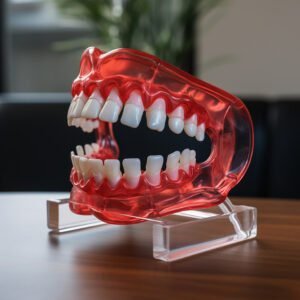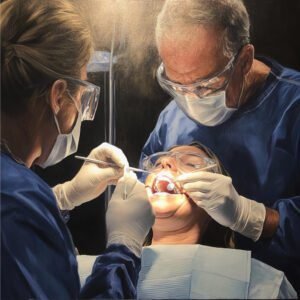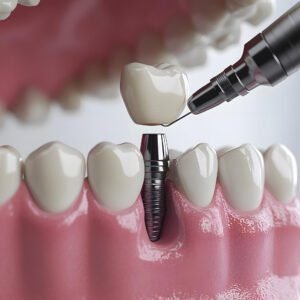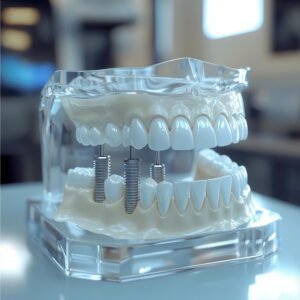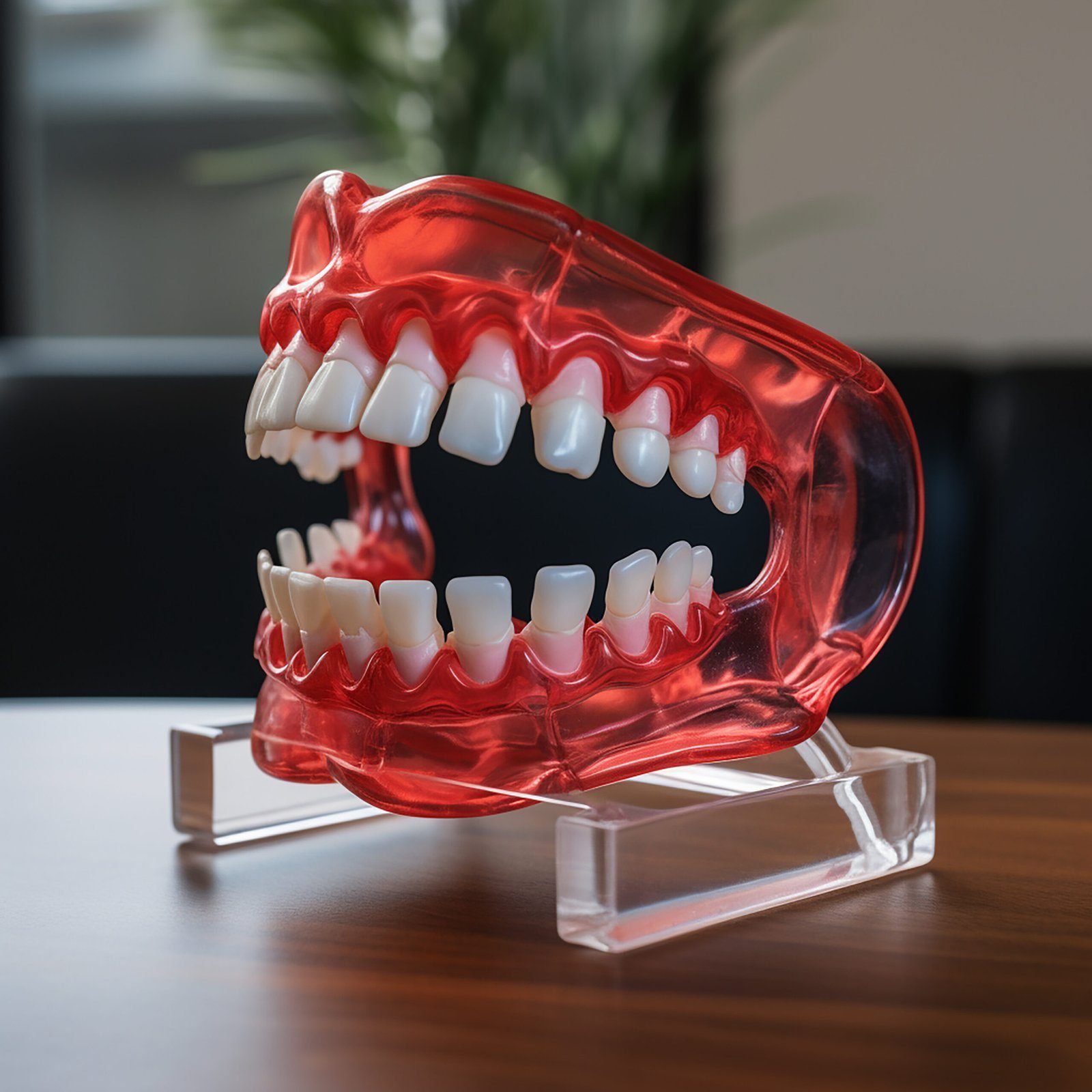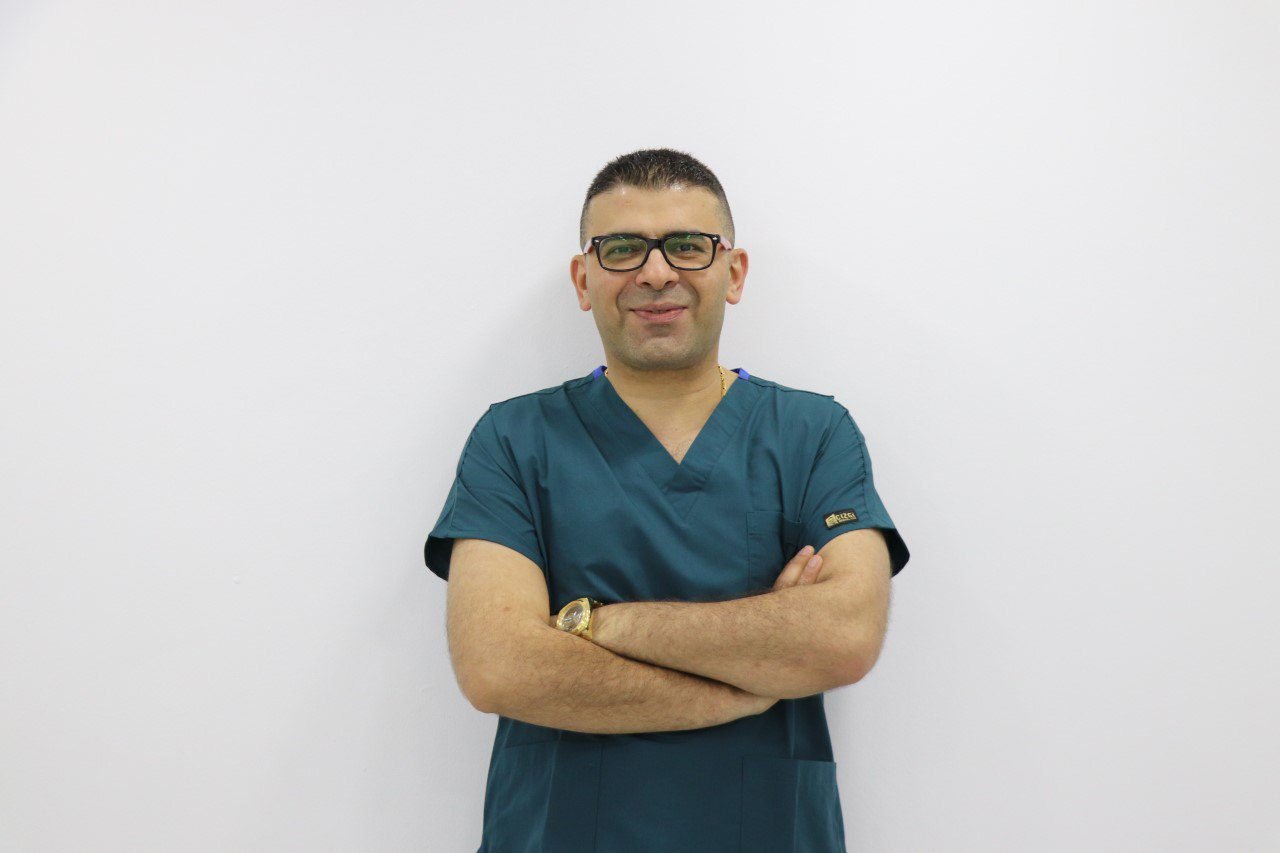Introduction to Dental Bridges
Dental bridges represent a pivotal advancement in restorative dentistry, offering a practical solution for individuals with missing teeth. These prosthetic devices are designed to bridge the gap created by one or more missing teeth, effectively restoring functionality and aesthetic appeal to the smile. The significance of dental bridges extends beyond mere appearance; they play a crucial role in maintaining oral health by preventing neighboring teeth from shifting out of alignment, which can lead to further dental complications.
The basic functionality of dental bridges involves attaching artificial teeth, known as pontics, to adjacent natural teeth or dental implants. The process begins with a thorough examination by a dentist, who will assess the extent of tooth loss and determine the most suitable type of bridge for the patient’s needs. There are several types of dental bridges, including traditional bridges, cantilever bridges, and Maryland bonded bridges, each tailored to address specific situations. Traditional bridges are the most common and involve placing crowns on the adjacent teeth to support the pontic. Cantilever bridges, on the other hand, are used when there is only one supportive tooth available, while Maryland bonded bridges utilize a framework bonded to the back of the adjacent teeth.
The benefits of dental bridges are multifaceted. Not only do they restore the ability to chew and speak comfortably, but they also enhance the overall confidence of an individual by improving the appearance of their smile. Furthermore, bridges can help maintain the structure of the jaw by distributing bite forces evenly, preventing bone loss, and promoting better oral hygiene by making it easier to keep the mouth clean. Overall, dental bridges are a vital component in restorative dentistry, contributing significantly to the oral health and well-being of patients.
Types of Dental Bridges
Dental bridges are an effective solution for individuals experiencing tooth loss, serving to restore both functionality and aesthetics. The classification of dental bridges can be broadly categorized into four main types: traditional bridges, cantilever bridges, Maryland (or resin-bonded) bridges, and implant-supported bridges. Each type offers distinct designs, materials, and ideal scenarios for usage.
Traditional dental bridges are the most commonly used type. They consist of one or more artificial teeth, known as pontics, which are anchored by dental crowns placed on the adjacent natural teeth. This design provides stability and is typically constructed from materials such as porcelain, ceramic, or metal, ensuring a durable and aesthetically appealing solution.
Cantilever bridges are similar to traditional bridges, but they require only one adjacent tooth for support. This design is most useful in scenarios where there are not enough healthy teeth available for anchoring. They are often recommended for the back teeth, where the pressure from chewing is comparatively lesser. The materials used in cantilever bridges mirror those in traditional versions, prioritizing strength and appearance.
Maryland bridges, also referred to as resin-bonded bridges, offer a minimally invasive alternative. They typically feature a porcelain or metal pontic supported by a framework that is bonded to the back of the adjacent natural teeth. This type is particularly beneficial when the dentist seeks to preserve the structure of the adjacent teeth, making Maryland bridges an attractive option for front teeth replacements.
Lastly, implant-supported bridges are an advanced solution that employs dental implants to support the bridge. During this procedure, titanium posts are surgically placed into the jawbone, providing a robust foundation for the bridge. This type is advantageous for those with significant bone loss or where traditional bridges may not be feasible. In summary, each type of dental bridge presents unique attributes, allowing patients to explore the most suitable option for their specific dental needs.
Advantages of Dental Bridges
Dental bridges offer a multitude of advantages for individuals seeking to restore their smile and oral functionality. One primary benefit is the restoration of proper chewing ability. When a tooth is missing, the pressure on the surrounding teeth during chewing can become uneven, leading to discomfort and potential damage. A dental bridge effectively fills that gap, allowing for balanced chewing and reducing strain on remaining teeth.
Another important advantage of dental bridges is their role in preventing the shifting of adjacent teeth. When a tooth is lost, the surrounding teeth may begin to drift towards the gap, which can lead to misalignment and further dental complications over time. By securing a dental bridge, patients can maintain their dental arch’s integrity and minimize the risk of teeth shifting, promoting long-term oral health.
Improving speech is yet another significant benefit offered by dental bridges. Missing teeth can hinder articulation, making it challenging for individuals to pronounce certain sounds clearly. With a dental bridge in place, patients often experience enhanced speech clarity, leading to improved communication and overall confidence.
Aesthetically, dental bridges contribute substantially to enhancing one’s appearance. They are designed to mimic natural teeth closely, and once placed, they can restore a person’s smile, boosting self-esteem and encouraging social interactions. An attractive smile can positively impact personal and professional relationships.
Finally, dental bridges are often a cost-effective solution compared to other dental restorations like implants. While dental implants might offer longer-term solutions, the initial investment can be considerably higher. In contrast, dental bridges can provide similar functional and aesthetic benefits at a more affordable price point, making them a sensible option for many individuals seeking dental restoration.
How to Care for Dental Bridges
Maintaining the longevity and functionality of dental bridges is paramount for oral health. Proper dental hygiene practices play a crucial role in ensuring that both the bridge and the supporting teeth remain in excellent condition. One of the most significant aspects of care involves effective brushing techniques. It is essential to brush at least twice a day using a soft-bristled toothbrush and fluoride toothpaste, focusing not only on the bridge itself but also on the surrounding gums and supporting teeth.
Flossing is another vital practice that should not be overlooked. Traditional floss may not adequately clean around the bridge, so utilizing floss threaders or interdental brushes can be immensely beneficial. These tools allow for thorough cleaning of the areas between the bridge and adjacent teeth, preventing plaque buildup and gum disease. Regular flossing helps maintain the overall health of your mouth, which is essential for long-term bridge success.
Dietary considerations also play a critical role in the care of dental bridges. It is advisable to avoid foods that are especially hard, chewy, or sticky, as they can dislodge the bridge or damage it. Instead, focusing on a balanced diet that includes softer foods can promote better dental health. Additionally, staying hydrated and limiting sugary snacks can further reduce the risk of decay in the supporting teeth.
Regular dental check-ups cannot be stressed enough when discussing dental bridge care. Visiting the dentist at least twice a year allows for professional cleanings and monitoring of the bridge’s condition. Your dentist can provide tailored advice and address any concerns that may arise, ensuring your dental bridge remains a functional and healthy part of your smile. In summary, consistent oral hygiene, careful dietary choices, and routine dental visits are essential for the optimal maintenance of dental bridges.
Possible Complications and How to Avoid Them
Dental bridges are effective solutions for restoring a complete smile, yet they are not without potential complications. Understanding these issues and employing preventive measures can significantly enhance the longevity and success of the bridge while ensuring the health of adjacent teeth and gums. One common complication is gum disease, which can develop due to improper oral hygiene practices. When plaque accumulates around the bridge and adjacent teeth, it can lead to inflammation and infection. To mitigate this risk, it is essential to maintain a diligent oral hygiene routine that includes brushing at least twice daily and daily flossing, particularly around the bridge.
Another major concern is decay in adjacent teeth, which might be exacerbated by the presence of a dental bridge if proper care is neglected. The supporting teeth, often referred to as abutment teeth, are vital to the stability of the bridge and need attention to prevent cavities among their structure. Regular dental check-ups and cleanings can help in early detection of any decay, allowing timely intervention to preserve both the bridge and the supporting teeth.
Additionally, issues may arise directly with the bridge itself, such as loosening or damage due to excessive force or biting down on hard substances. To avoid complications in this area, it is advisable to refrain from chewing on hard foods or objects and to wear a mouthguard if you engage in contact sports. Furthermore, patients should consult with their dentist about the right type of materials and construction for their dental bridge, as some options may offer better durability depending on individual bite strength and jaw alignment.
Ultimately, proactive care and regular consultations with a dental professional can help prevent these complications, ensuring that your dental bridge remains functional and your oral health stays intact.
Choosing the Right Clinic for Dental Bridges
Choosing an appropriate clinic for dental bridges is paramount to ensure a successful treatment outcome. First and foremost, the qualifications and experience of the dental team should be thoroughly examined. It is important to select a clinic where dentists are specialized in prosthodontics, particularly in the installation of dental bridges. Professionals should hold relevant certifications, be registered with appropriate dental associations, and have substantial experience in the field to enhance confidence in the care you will receive.
Another critical factor is the clinic’s facilities and technology. Advancements in dental technology can significantly impact the effectiveness of dental bridge procedures. A well-equipped clinic that utilizes modern technology, like digital imaging and CAD/CAM systems, can provide better accuracy and comfort during treatment. Potential patients should also assess the cleanliness and overall environment of the clinic, as a sterile and organized space is essential for patient safety and comfort.
Patient reviews are invaluable in the decision-making process. Prospective patients should take the time to read testimonials and feedback from previous patients regarding their experiences with the clinic, particularly concerning dental bridges. These reviews can shed light on different aspects such as the quality of care, waiting times, and the overall patient experience. Moreover, personal recommendations from friends or family who have undergone similar procedures may provide additional insights into trustworthy clinics.
A preliminary consultation should never be overlooked, as it allows for personal interaction with the dental team. This meeting is an opportunity to ask questions, address concerns, and evaluate the dentist’s communication style and approach to care. Ultimately, choosing the right clinic for dental bridges entails careful consideration of qualifications, facilities, patient feedback, and the significance of initial consultations to achieve the best possible outcome.
Why Dr. Abdulrahman Ozturk’s Clinic is the Best in Turkey
Dr. Abdulrahman Ozturk’s clinic in Istanbul stands out as one of the leading dental facilities in Turkey, renowned for its exceptional care and professional approach to dentistry. The clinic has garnered a strong reputation not only locally but also internationally, attracting numerous patients seeking high-quality dental treatments, including dental bridges. Dr. Ozturk, a highly qualified dental specialist with a background in restorative and cosmetic dentistry, has over a decade of experience. His dedication to patient satisfaction and innovative techniques sets him apart in the field.
The clinic prides itself on employing cutting-edge technology to enhance patient outcomes. State-of-the-art equipment, including digital X-rays and 3D imaging, ensures precise diagnostics and treatment planning. Additionally, the facility adheres to the highest hygiene standards and protocols, providing a safe environment for all patients. Dr. Ozturk and his team of well-trained professionals stay abreast of the latest advancements in dental science, which enables them to deliver effective solutions tailored to individual needs.
Patient testimonials reflect the clinic’s commitment to excellence. Many former patients report positive experiences, emphasizing the compassionate approach of Dr. Ozturk and his staff. Their commitment to open communication and personalized care creates an atmosphere of trust, helping patients feel comfortable during their dental procedures. Furthermore, the clinic offers competitive pricing without compromising service quality, making advanced dental care accessible to a broader audience.
In summary, the combination of Dr. Abdulrahman Ozturk’s extensive expertise, the clinic’s modern facilities, and a patient-centered approach make it a top choice for those seeking dental bridges and other restorative treatments in Turkey.
Patient Experiences and Testimonials
At Dr. Ozturk’s clinic, numerous patients have undergone dental bridge procedures, with many expressing high levels of satisfaction regarding the outcomes. One patient shared that the transformation was remarkable, stating, “After receiving my dental bridge, I can smile with confidence again. I never realized how much I had been holding back until I saw my new smile.” This type of feedback illustrates the profound impact that dental bridges can have on an individual’s self-esteem and overall quality of life.
Another patient remarked on the professionalism and care provided by the clinic’s staff during the process. “From my initial consultation to the final adjustment of my dental bridge, every step was handled with utmost care,” they noted. The thorough approach taken by Dr. Ozturk and the team not only demystified the procedure but also instilled a sense of trust, which is vital for any patient undergoing dental treatment.
Many individuals are also appreciative of the lasting benefits that dental bridges have afforded them. A long-time patient who had been struggling with the gap caused by missing teeth explained, “The bridge has made it much easier for me to eat and speak. I never knew there could be such a difference.” This sentiment is echoed by others who have undergone similar treatments, emphasizing the functional and aesthetic improvements gained from the procedure.
Moreover, patients frequently highlight the post-procedure support they received. One individual stated, “The follow-up appointments were crucial. It was reassuring to know that the clinic was still there to support me, ensuring everything was healing well.” Such patient experiences underline the dedication of Dr. Ozturk’s clinic to not only provide effective dental solutions but also to foster lasting relationships with patients, ensuring their needs are fully addressed throughout the journey.
Conclusion: Making an Informed Choice
In the journey of maintaining oral health, understanding the various dental solutions available is paramount. Dental bridges stand out as a proficient method for addressing the challenges posed by missing teeth. These restorative options not only enhance aesthetic appeal but also promote better functionality, ensuring that everyday activities such as eating and speaking remain uninterrupted. By recognizing the different types of dental bridges—traditional, cantilever, Maryland, and implant-supported patients can make informed decisions based on their unique needs and circumstances. Each type offers specific advantages, making it crucial for individuals to consult with dental professionals to determine the most suitable option for them.
Furthermore, the benefits of opting for dental bridges extend beyond mere aesthetics. They play a vital role in maintaining the alignment of surrounding teeth, helping to prevent bite issues and other dental complications in the future. It is also essential to emphasize the importance of proper care and maintenance of dental bridges through good oral hygiene practices. Regular check-ups, combined with proper brushing and flossing techniques, can significantly extend the lifespan of these dental restorations.
For anyone considering dental bridges, selecting a reputable clinic is equally important. A professional clinic, such as Dr. Abdulrahman Ozturk’s, is equipped with advanced technology, skilled practitioners, and strong patient support, which are crucial elements for successful treatment. Patients should prioritize consulting with experienced specialists who ensure personalized care tailored to their specific needs. By doing so, individuals not only receive quality solutions but also confidence in their treatment process. Ultimately, making an informed choice about dental bridges involves understanding their characteristics, benefits, and the significance of the dental clinic’s role in achieving optimal results.


